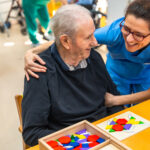The terms dementia and Alzheimer’s are often used interchangeably, but the two mean slightly different things.
Dementia typically refers to the overall symptoms of memory loss, communication difficulties and problems completing everyday tasks. Alzheimer’s disease, however, is a type of dementia that gets progressively worse as time goes on and is most commonly associated with memory, language and other cognitive difficulties.
Understanding the difference between the two empowers individuals with dementia or Alzheimer’s, as well as their loved ones and care providers, as it gives the necessary knowledge behind each disease so you can get the best support for your specific needs.
In this article, we’ll explain the difference between Alzheimer’s and dementia and highlight some common signs and symptoms that you can look out for if you’re concerned.
Dementia vs Alzheimer’s
While dementia is a general term used for diseases that cause a decline in cognitive ability and changes in mood and behaviour, Alzheimer’s disease is a specific disease that is the most common cause of dementia.
In other words, Alzheimer’s disease is one cause of dementia, while dementia is an umbrella term for a range of different illnesses. Strictly speaking, there is no difference: dementia is the overall category.
There are some symptoms of other kinds and causes of dementia that don’t appear until the later stages of Alzheimer’s disease. If your loved one is demonstrating more language problems or behavioural changes, it’s likely they have a different kind of dementia, such as Frontotemporal dementia.
Understanding what the two terms mean and the differences between them is important in empowering individuals living with these conditions and their caregivers, and giving them the correct knowledge to get the best support available.
What is Dementia?
While we often refer to dementia as its own disease, medically speaking, it’s an umbrella term that covers a range of different, specific illnesses. It’s a catch-all that refers to symptoms such as:
- Memory loss: Individuals with dementia will typically have memory issues, for example, being unable to recall recent events.
- Confusion: People with dementia might become confused when in unfamiliar environments and struggle to follow conversations.
- Problems carrying out everyday tasks: Dementia might make it hard for people to carry out mundane, everyday tasks, such as cooking a meal or dressing themselves.
- Communication and language problems: Individuals with dementia might struggle with communication, including struggling to find the right words for something.
- Difficulty retaining focus or paying attention: People with dementia might struggle to remain focused and be unable to carry out tasks that require them to follow a multi-step process.
- Behavioural changes: Individuals with dementia might display changes in personality and mood, for example, they might become more anxious or depressed.
- Trouble with tasks that require organisation or planning: Dementia can impact your problem-solving skills and can make it difficult for the individual to make decisions and stay organised.
Not all those with dementia will have all of these symptoms, nor will they have them to the same degree. In most cases, however, the symptoms will get progressively worse as the disease develops.
While many of the symptoms of dementia look like the typical signs of ageing, it’s important to know that dementia is more complicated. It’s caused by abnormal changes to the brain that trigger a decline in a person’s cognitive abilities.
Learn more about the symptoms of dementia
What causes dementia?
There are over 200 subtypes of dementia, each with its own specific set of causes and sets of symptoms. Some of the most common types and causes of dementia include:
- Vascular dementia is one of the more common forms of dementia, caused by problems with the blood supply to the brain.
- Frontotemporal dementia (FTD) is much less common and is due to progressive damage to the frontal or temporal lobes.
- Lewy body dementia is another common form of dementia and occurs when protein deposits clump together in the brain, which can make it difficult to control movements.
- Parkinson’s disease dementia is a type of dementia affecting those who have previously been diagnosed with Parkinson’s. It can cause a range of symptoms, from hallucinations and tremors to difficulty concentrating and problems sleeping.
- Mixed dementia occurs when more than one type or cause of dementia is present, for example, if someone has symptoms related to Alzheimer’s disease and Lewy body dementia.
What is Alzheimer’s Disease?
Alzheimer’s disease is the most common cause of dementia, accounting for between 60%-80% of cases.
Like most kinds of dementia, it usually affects people over the age of 65, but those in their 40s and 50s might develop early-onset Alzheimer’s. In these cases, Alzheimer’s can be genetic, with family members across multiple generations developing the disease.
Depending on who you ask, there are up to 7 stages of Alzheimer’s, from the preclinical stage to a lack of physical control. However, it’s easier to understand them as 3 main categories: early-, middle- and late-stage:
- Early-stage Alzheimer’s: During the early stages of Alzheimer’s disease, individuals can typically live and function independently. However, they may start displaying symptoms, such as memory lapses or memory loss.
- Middle-stage Alzheimer’s: The middle stage of the disease is usually the longest, and symptoms become more pronounced. The individual might need more assistance with carrying out daily tasks and show changes to their personality.
- Late-stage Alzheimer’s: Symptoms are most severe during the final stages of the disease. Individuals might show significant changes to their personality and will likely need extensive levels of care.
Learn more about the different stages of Alzheimer’s Disease.
What causes Alzheimer’s disease?
The causes of Alzheimer’s disease are complex, though it is suggested that the largest contributing factor is the buildup of two proteins, ‘amyloid’ and ‘tau’, in the brain.
These proteins clump up in the brain when conditions aren’t right, forming what is known as plaques and tangles. This makes it more difficult for the brain to function as it should.
As the disease progresses, brain cells begin to die and parts of the brain shrink. The amount of important chemicals in the brain also reduces, so messages are not as easily passed around the brain. This is what causes symptoms associated with Alzheimer’s.
How do I know what type of dementia I have?
It is important to know which type of dementia you have to be able to get the most appropriate care and support.
If you believe you might have dementia, you should consider getting a dementia diagnosis from a healthcare professional or dementia specialist. It can be difficult to know what type of dementia an individual has, particularly during the early stages. However, you should be told the type of dementia you have by your doctor if it is identifiable.
Dementia treatment with Dementech
Understanding dementia and Alzheimer’s disease can be very difficult for individuals and their loved ones. The experts at our leading private memory clinic can help, from dementia diagnosis and treatment to a bespoke, end-to-end service that has helped thousands of families live happier, healthier lives.
Contact us today or book an appointment to arrange a consultation with a dementia specialist, if you are concerned about signs of memory loss in yourself or a loved one.
From rapid testing to state-of-the-art facilities and clinical trials, we can offer a wide range of support for both patients and their families.





